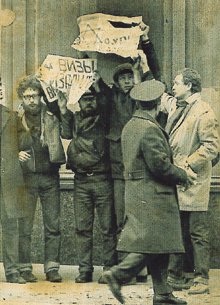
Refusenik was an unofficial term for individuals—typically, but not exclusively, Soviet Jews—who were denied permission to emigrate, primarily to Israel, by the authorities of the Soviet Union and other countries of the Soviet Bloc. The term refusenik is derived from the "refusal" handed down to a prospective emigrant from the Soviet authorities.
Natan is a masculine given name, from which Nathan is derived, and a surname. It may refer to:

Natan Sharansky is a Soviet dissident and later Israeli politician, human rights activist and author who spent nine years in Soviet prisons as a refusenik during the 1970s and 1980s. He served as Chairman of the Executive for the Jewish Agency from June 2009 to August 2018. Sharansky currently serves as chairman for the Institute for the Study of Global Antisemitism and Policy (ISGAP), an American non-partisan organization.

Yisrael BaAliyah was a political party in Israel between its formation in 1996 and its merger into Likud in 2003. It was formed to represent the interests of Russian immigrants by former refuseniks Natan Sharansky and Yuli-Yoel Edelstein. Initially a centrist party, it drifted to the right towards the end of its existence.

Mordechai Tzemach Eliyahu, was an Israeli rabbi, posek, and spiritual leader.

Ronald Greenwald was an American Orthodox Jewish rabbi, who was a businessman and an educator.

Avraham Haim Yosef (Avi) haCohen Weiss is an American Open Orthodox ordained rabbi, author, teacher, lecturer, and activist who led the Hebrew Institute of Riverdale in The Bronx, New York until 2015. He is the founder of Yeshivat Chovevei Torah for men and Yeshivat Maharat for women, rabbinical seminaries that are tied to Open Orthodoxy, a breakaway movement that Weiss originated, which is to the left of Modern Orthodox Judaism and to the right of Conservative Judaism. He is co-founder of the International Rabbinic Fellowship, a rabbinical association that is a liberal alternative to the Orthodox Rabbinical Council of America, and founder of the grassroots organization Coalition for Jewish Concerns – Amcha.
Elie Yossef is a London-born Israeli educator and political activist.

Fear No Evil is a book by the Soviet-Israeli activist and politician Natan Sharansky about his struggle to immigrate to Israel from the former Soviet Union (USSR). The book tells the story of the Jewish refuseniks in the USSR in the 1970s, his show trial on charges of espionage, incarceration by the KGB and liberation.

The baal teshuva movement is a description of the return of secular Jews to religious Judaism. The term baal teshuva is from the Talmud, literally meaning "master of repentance". The term is used to refer to a worldwide phenomenon among the Jewish people.

Ida Yakovlevna Nudel was a Soviet-born Israeli refusenik and activist. She was known as the "Guardian Angel" for her efforts to help the "Prisoners of Zion" in the Soviet Union.

In Israel, prisoners of Zion were Jews who were imprisoned or deported for Zionist activity in countries where such activity was prohibited. The former Speaker of the Knesset, Yuli Edelstein, and the former Chairman of the Executive of the Jewish Agency, Nathan Sharansky, were both prisoners of Zion in the Soviet Union. In 1992 an Israeli law made the status of the prisoner of Zion official, however the status was in use long before.

Zion (Sion) Rajamim Levy (1925–2008) was the Sephardic Chief Rabbi of Panama for 57 years. His tenure is thought to be the longest of any religious leader in the region. He built up a Jewish community of 6,000-7,000 Torah-observant Jews in a country of 3 million.
The Movement for Democracy and Aliyah, commonly known as Da, was a minor Israeli political party founded by immigrants from the former Soviet Union in the early 1990s.

Vladimir Prison, popularly known as Vladimir Central, is a prison in Vladimir, Russia. It is the largest prison in Russia, with a capacity of 1,220 detainees, and is operated by the Federal Penitentiary Service as a maximum-security prison with most inmates serving a minimum of ten years to life sentences.
Iosif Ziselovich Begun, sometimes spelled Yosef, whose last name is pronounced "bee-goon" and in Russian literally means "runner," is a former Soviet refusenik, prisoner of conscience, human rights activist, author and translator. Over the course of 17 years, Begun was imprisoned three times and spent over eight years in prisons and labor camps as a political prisoner. He was pardoned and freed in 1987 after political pressure from Jewish political organizations and the U.S. Government.

Zion Blumenthal Orphanage is an Orthodox Jewish orphanage and educational institution in Jerusalem. Founded in 1900, it is the oldest active orphanage in Israel.
Freedom Sunday for Soviet Jews was the title of a national march and political rally that was held on December 6, 1987 in Washington, D.C. An estimated 200,000 participants gathered on the National Mall, calling for the General Secretary of the Communist Party of the Soviet Union, Mikhail Gorbachev, to extend his policy of Glasnost to Soviet Jews by putting an end to their forced assimilation and allowing their emigration from the Soviet Union. The rally was organized by a broad-based coalition of Jewish organizations. At the time, it was reported to be the "largest Jewish rally ever held in Washington."

The Genesis Prize is a $1 million annual prize awarded to Jewish people who have achieved significant professional success, in recognition of their accomplishments, contributions to humanity, and commitment to Jewish values.

Avital Sharansky is a former activist and public figure in the Soviet Jewry Movement who fought for the release of her husband, Natan Sharansky, from Soviet imprisonment.
















